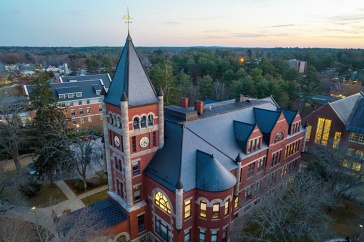
Mental health and substance abuse issues have moved to the forefront of conversation in recent years. With the surge in societal awareness, the need for behavioral health professionals has become increasingly apparent.
In response to the workforce shortage in the Granite State, the University of New Hampshire has adopted a hybrid model for its Master of Social Work (MSW) program. The new model increases flexibility for working professionals by combining online activities with in-person classes on Saturdays at the University’s Manchester campus.
“The hybrid model offers the flexibility of online programs and the close personal relationships of traditional campus classes,” said Jerry Marx, associate professor and coordinator of the MSW program on the Manchester campus. “By making the MSW more accessible, we can better serve those who wish to advance their careers in the meaningful, high-need field of social work.”
The Bureau of Labor Statistics projects that between 2016 and 2026, jobs for social workers will increase by 16 percent—more than double the national average growth rate. UNH seeks to help meet this demand through the changes to its MSW program, which currently places 96 percent of its graduates into jobs in the field.
One such graduate is Meredith Young ‘11G, who earned her MSW on the Durham campus and now serves as vice president of community impact for Granite United Way. Young says the MSW’s expanded online presence opens doors for more people to pursue further education in the field.
“Online courses allow for great candidates to pursue social work as a career while continuing to work,” Young said. “As a field supervisor and adjunct faculty member, I have met some truly amazing social work candidates through the online degree option—many of whom would not have had the opportunity without this innovative expansion of the department.”
The MSW program at UNH focuses on blending theory with practice, allowing students to put classroom learning into action through hands-on work at real organizations. Sarah Gagnon ‘08G, vice president of clinical operations at Riverbend Community Mental Health, says the balance of coursework and field experience fostered her growth.
“The program helped me have the confidence to be an agent of change in the community,” Gagnon said. “It prepared me to be a leader in this field and set a path to grow personally and professionally.”
UNH’s MSW is accredited by the Council on Social Work Education and offers four fields of practice: health and mental health; addiction/substance use; child, youth and families; and intellectual and developmental disabilities. The program is designed to give graduates the skills to respond to the growing complexities of today’s social problems. The solution to these situations, Young says, lies in empowerment.
“Our calling in the field is to create opportunities for individuals and communities to solve problems and lead healthier lives, and this means we need to empower individuals to be change agents,” Young said. “We all have something to give back to our communities. Our job as social workers is simply to empower people and connect the dots.”
The MSW program is available online, in-person on the Durham campus and in a hybrid model at UNH Manchester.
-
Written By:
Kassidy Taylor | Marketing & Communications, UNH Manchester | kassidy.taylor@unh.edu
















































